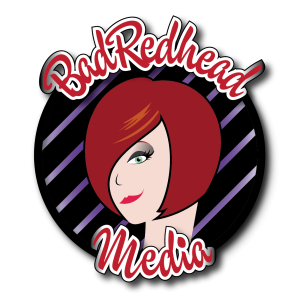Why Do I Need an Editor by guest @JanieJunebug
By Janie “Junebug” Goltz

Greetings, BadRedhead Media Fans!
Rachel has asked me – an editor – to write about why writers need editors. I was a strong believer in editors even before I became one. When I was getting my bachelor’s degree in English, I worked as a grader for a professor. I tutored his English 101 students and commented on their essays so they could make improvements before the professor saw their work. Students who took advantage of my suggestions tended to get higher grades.
A relationship with an editor can be equally beneficial to the writer when work is submitted to a publisher rather than a professor.
Consider it this way: You’re a good writer. You’re a very good writer. You have a degree in English or Communications or maybe even a master’s in creative writing. You might have some publication credits to your name.
Hiring an editor to go over your manuscript may seem like a waste of time and money to you, but just as every parent needs an extra set of hands, every writer needs an extra set of eyes.
I read carefully. But a couple of days ago I saw a common saying that had been written incorrectly by design. I had to read the incorrect phrase three or four times before I noticed what had been changed. Our brains make automatic corrections. Or we can compare what we view to selective hearing; that is, we see what we want to see.
Writers become so familiar with their manuscripts that they often perceive words as correct when they aren’t. Or they have a little brain fart and “its” accidentally turns into “it’s”. Maybe they become attached to a particular word and start using it over and over without thinking about. Their syntax could be confusing, even though it makes perfect sense to them.
Familiarity doesn’t always breed contempt. For writers, familiarity can breed obliviousness. I know: I write. I used to be a newspaper reporter, and now I blog. I’m not immune from bloopers and lapses in concentration.
In general, editors have three possible tasks. Writers need to be clear about what they want when they hire editors.
First, the writer might need someone to look for typos, and that’s it. That should be the least expensive kind of editing.
Second, the writer might need someone to do a “line edit”; that is, the editor looks for deeper problems. How can the writer’s syntax be improved? Has the writer chosen the best word to fit a description?
Finally, developmental, or substantive editing, is the most intense. Does the plot make sense? Has the writer skipped some detail, no matter how large or small, that makes it more difficult for the reader to understand the story? Developmental editing should incorporate its name. The editor goes to greater lengths to assist the writer in advancing the text.
We don’t want readers, especially publishers, tossing aside a book because it’s not a clean and smoothly written manuscript.
I once edited a memoir and gave it the entire Janie Junebug treatment. I corrected errors, but also showed the writer that her book was really a coming of age story with a journey-quest motif. She was able to build on that knowledge to make her manuscript stronger.
Now, we need to chat about the cost of an editor. A good editor can be worth her weight in gold because she corrects boo-boos, and she supports the writer when she’s feeling down.
I’ve seen a lot of different ways to come up with a fee.
Some editors charge by the hour. Some charge by the number of words. The price might go from 25 cents per word for seeking out typos, to 75 cents a word for developmental editing. These amounts are approximations, of course. A more experienced editor will probably charge more than someone who’s not yet established in the editing field. I know one somewhat inexperienced editor who charges one cent for every three words.
Occasionally an editor will accept a small fee, or even no fee, upfront, and then receive a percentage of the profits from the book. Editors who agree to this practice take a risk, but when we believe in a book, sometimes we gamble a bit.
Personally, I like to develop a trusting relationship with clients and then agree on a fee based on the amount of work a manuscript needs. Why should I charge writers by the word if the text doesn’t require many changes?
Ultimately, writers need to choose editors – and editors need to accept writers – based on what works for the individual case.
If you’re a writer with so many rejection letters that you could wallpaper your home office, or if you want to make good writing better, consider an editor. You can find editors online and check out their credentials, but word-of-mouth can be especially helpful. Other writers can tell you how a particular editor met their needs.
A good editor grasps grammatical concerns, comprehends developmental needs, and in the best cases, will be your biggest cheerleader.
If you have questions about editing, or if you want to know where that pesky semicolon belongs, then feel free to contact me at dumpedfirstwife@gmail.com. That’s the email address associated with my blog, WOMEN: WE SHALL OVERCOME, where I’ve been known to disperse useful grammar tips.
Thank you so much, Rachel, for inviting me to visit. I love to talk and write about editing because I love doing it. Editing scratches my little OCD itch.

Dear Cindy,
Sometimes I interview indie authors on my blog. When I ask them what they wish they had known before publishing their books, they often say they wish they had taken advantage of the opportunity to hire an editor because they didn’t realize how many errors they missed.
Love,
Janie
Great post. Professional painters often hold their canvases up to mirrors because they’ve looked at their work so long and hard that they can no longer view it objectively. Seeing a painting reversed let’s the artist see it with new eyes. When it comes to writing, an editor is like a mirror. Editors point out that which you are no longer capable of seeing.
That’s very interesting. I didn’t know that about artists.
Love,
Janie
I think everyone who writes a piece potentially for publication should have an editor. I’ve seen so many self published pieces that have glaring errors, which makes me not want to finish it.
The errors are distracting, aren’t they?
Love,
Janie
I came via your blog Janie and have to say what a bloody great read……………..
Thank you, Jo-Anne!
Love,
Janie
Great post Janieola! As always your work is a pleasure to read! And I learned something as well! And I use too many exclamation points! And I start too many sentences with “And”…
Annnndddddd, I’m gonna stop now. 🙂
And you are way cool, Stephanola!
Love,
Janieola
Hey Janie. Thanks so much for this ‘editor’ summary! Now I have a clearer idea about what editors really do and how they can help writers. A friend of mine wrote a couple of books and she said that a good editor was worth every cent she spent for their services. Makes a lot of sense.
A good editor is worth her weight in gold. And I’m on the heavy side.
Love,
Janie
You make some valid points. It’s very important to have a fresh set of eyes edit your manuscript!
We tend to see what we think is on the page instead of what’s really on the page.
Love,
Janie
Great points. I used to work in an editorial office once for a magazine. I got bored after a while.
http://www.thoughtsofpaps.com
Janie, you’re an amazing editor. I love your style and I love your edits. You edited both of my now published books and you make the editing process comfortable. You are so reliable. Keep up the good work.
As a freelance editor myself, I can attest that this is a really well-written post on editing! It’s comprehensive, but manageable. 🙂
Nicely put, Janie! Many people don’t realize how many different types of editing can be performed on a manuscript. You are one of the only editors I’d recommend.